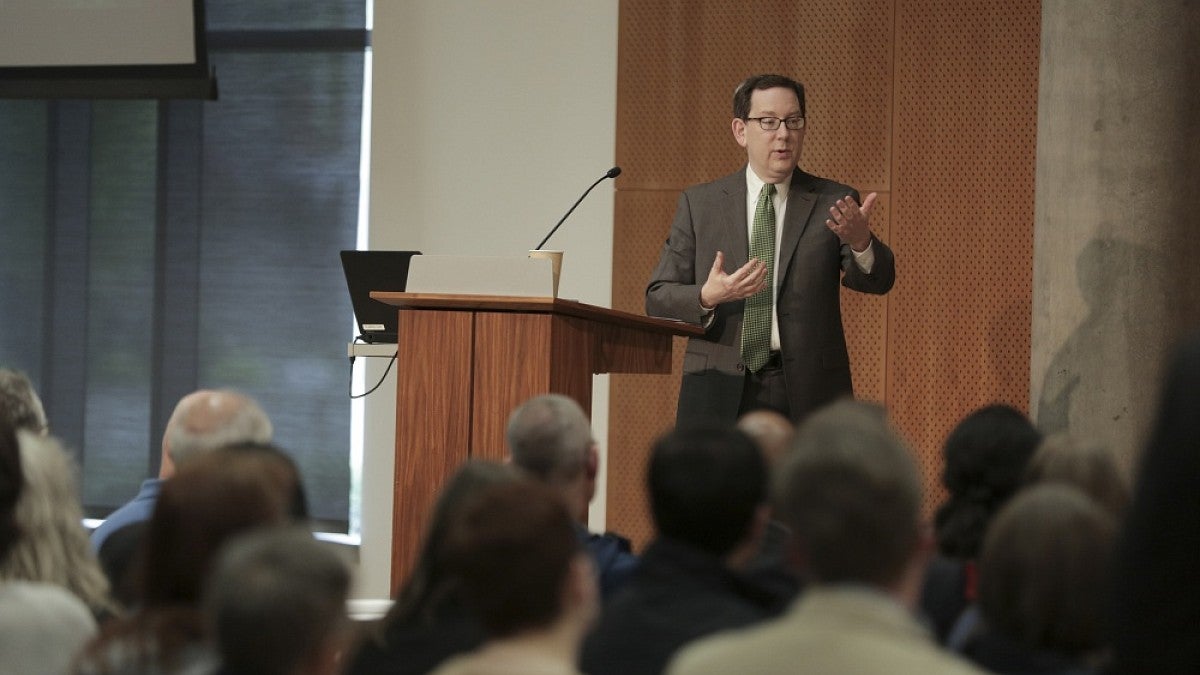UO President Michael Schill told a campus audience that the university is making progress in its efforts to enhance academics and join the nation’s pre-eminent research universities, but he cautioned that getting there requires hard but necessary choices.
Speaking Tuesday in the Ford Alumni Center, Schill said he has encountered wide support for raising the university’s academic profile. In the 10 months since he became president, the UO has freed up millions of dollars to start doing exactly that.
But he acknowledged that the changes have been challenging for individuals and departments as the university puts more emphasis on hiring tenure-track faculty and promoting research. And while he is sorry to lose the contributions and hard work of some of the institution’s contingent faculty and career staff, Schill said those decisions were necessary to fix issues stemming from past decisions before they become even more expensive to repair.
“We need to focus every dollar we have — every dollar — on making good, hard, strategic decisions that ensure the health, vitality and future growth of this university,” Schill said. “The fact is we have not carefully watched our central budget over the years. We should have done that. Resources shrank, and we weren’t watching. We have been digging a hole for many years, and if we don’t act now, the hole will get bigger and next year the decisions we have to make will be more painful.”
Schill outlined his plan for moving the UO forward, emphasizing the overall goals of enhancing teaching and research, improving access and success and providing a high-quality student experience. The university already is working toward the hiring of 80 to 100 new tenure-track faculty, increasing the number of doctoral students, building new research and faculty spaces, raising the four-year graduation rate and providing financial support for all qualifying Oregon students.
The university is making progress with its 40 active searches for tenure-related faculty, and the provost has approved another 21 supplemental hires for faculty next year, Schill said.
But to continue on that path, the university must complete a resource realignment that will shift more funding toward its strategic goals. Administrative vice presidents already have cut 2 percent of their general fund budgets, netting about $3 million in recurring funds for academics, and over the next three years they will cut an additional 3 percent, Schill said.
The university also will seek more support from donors and the state, and tuition will continue to be a critical part of the university budget. But the UO has little control over how much money it receives from any of those sources, Schill said, so it needs to be both careful and strategic with the dollars it has.
“What we control is how we spend our money,” he said. “And that’s what we need to do. We need to spend our money where it’s productive, and over 80 percent of our budget is people.”
The UO is close to the midpoint of its $2 billion fundraising campaign and Schill said donors are key to the university’s long-term strategy. Gifts have helped boost access and success initiatives by $17 million this year, keeping tuition affordable for Oregon students and bolstering efforts to help students academically and financially.
But making the changes necessary to set the university on a new course is hard, Schill said. It will require a foundation laid through culture and leadership, sound budgeting and financial planning, and a healthy campus infrastructure.
The job is not complete, the president said, but making difficult and necessary choices is the only way to realize the promise of a healthy, thriving institution known across the country for the strength of its research and teaching, its value to Oregon and to Oregonians and the quality of its student experience.
“I’ve been here 10 months and my excitement hasn’t waned, nor has my optimism about the job,” he said. “But I’m under no illusions that the last few months of setting priorities and realigning our resources has been easy. It hasn’t been easy, and it shouldn’t be easy. Nothing that is worth doing is easy. But we are making progress.”
Schill took several questions from the audience. Responding to one about his vision for the role of non-tenure-track faculty as the university moves to bolster its tenure-track ranks, he said untenured faculty will always play an important role at the UO.
“I believe that non-tenured faculty have an important role in this university. We couldn’t teach our students without you,” he said. “We’re never going to move to a situation where we don’t either value you or we don’t utilize untenured faculty.”
He also took questions from students on tuition and diversity and from faculty interested in support for the humanities, undergraduate research and the possibility of more cuts. On the latter question, Schill said great universities never stop reviewing expenses and shifting resources to match changing needs.
“We will always be looking at where we’re spending money,” he said. “That is essential to our success.”
—By Greg Bolt, University Communications


